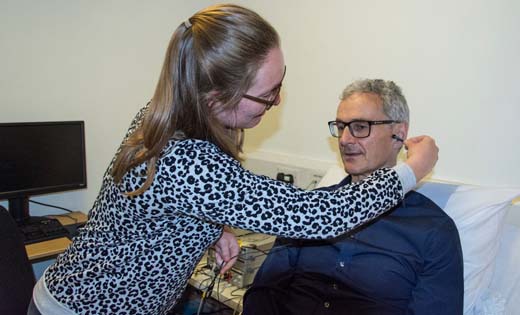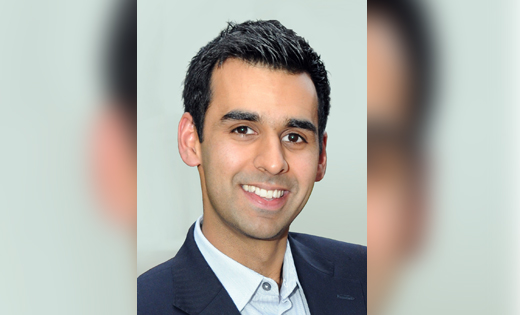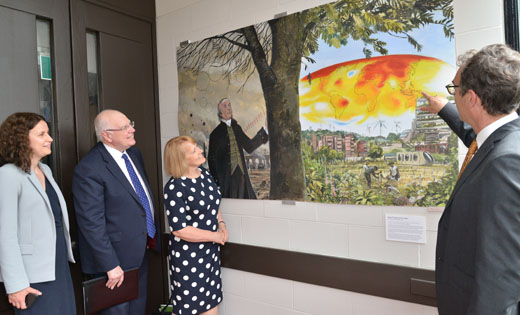Research Round-up – July 2019
Welcome to the latest instalment of our new monthly feature series throwing the spotlight on our research success stories.
The Government has confirmed funding for Leeds to create one of the most advanced conventional and high speed rail research facilities in the world

The strength of our research is in making a real and telling difference to the world around us, by working across traditional boundaries to find innovative solutions to some of the greatest challenges facing society today.
Here we highlight some of latest projects being pioneered by the expertise and efforts of the highly talented research community at Leeds.
From grant awards to examples of outstanding interdisciplinary work and best practice, we’re keen to showcase your research achievements. See the foot of this article for details of how you can get involved.
Featured in this month’s round-up:
- High Speed Rail
- MIT REAP boost
- ‘Tickle’ therapy could help slow ageing
- Oral hygiene links to rheumatoid arthritis
- Cancer diagnosis impact on teenagers and young adults
- Improving the nutritional quality of baby food
- Celebrating climate collaborations
- Fossil fuels offer poor return on energy investment
- Using weather radar to monitor insects
- Building up appetite for new kind of grub
- Who should pay for our parks?
- ‘Atomic dance’ in quantum physics
- Pump-priming for interdisciplinary research
- Ignite your research funding
- ‘Surgery’ to support pedagogic research
- Research Spotlight video
- How to feature in future round-ups
 Designs for the Institute
of High Speed Rail and System Integration. Picture: Atkins Artist’s Impression
Designs for the Institute
of High Speed Rail and System Integration. Picture: Atkins Artist’s Impression
Funding agreed for cutting-edge experimental rail facility
The Government has confirmed funding to create one of the most advanced conventional and high speed rail research facilities in the world.
The Institute for High Speed Rail and System Integration (IHSRSI) at Leeds will revolutionise the way new railway systems are invented, developed and brought into service.
It will be located next to the Leeds City Region Enterprise Zone and forms the early phase of an ambitious plan involving local authorities and businesses to position the City Region as a UK centre for rail engineering, which will generate jobs and inward investment.
At the heart of the Institute will be the capability to investigate rail systems as an integrated whole: measuring how train, track, power systems and signals interact as a unified system.
The cutting-edge facilities will result in research that will transform transport systems not only here in the UK but across the world.
The Government has contributed £11 million towards the capital costs of the project. A further £40 million has come from the University and rail industry partners, adding to £13 million from the Leeds City Region Local Enterprise Partnership Growth Deal.
Professor Lisa Roberts, Deputy Vice-Chancellor: Research and Innovation at Leeds, said: “The real power of the Institute is that it has been designed with the rail industry, to help it address some of its big research questions. Working together with industry, we will play a big role in future rail innovation.
“If you look at the Government’s Industrial Strategy, never before has it been so important for universities to work with business and industry, and the UKRPIF scheme is truly catalysing those collaborations.”
 Leeds is hosting the next stage in a
globally renowned programme to accelerate economic growth, job creation and
social change
Leeds is hosting the next stage in a
globally renowned programme to accelerate economic growth, job creation and
social change
Leeds to host major international innovation programme
Leeds and the City Region has been chosen to host a prestigious international programme in partnership with one of the world’s most famous universities, Massachusetts Institute of Technology (MIT).
More than a hundred leaders from government, business, universities and finance, as well as entrepreneurs from across the world, will converge on Leeds to understand more about the region’s strengths and ambitions.
It will also position Leeds and the City Region at the forefront of the Government’s drive for national growth and increased competitiveness.
The MIT innovation programme provides expert, evidence-based guidance to support regions to accelerate economic growth, job creation and social change.
It has helped nations and cities such as Beijing, Tokyo and Qatar in the past, shaping their economic and societal impact.
Leeds is hosting the next stage in the global programme in January 2020, having successfully bid for a place on the globally renowned two-year MIT Regional Entrepreneurship Acceleration Programme (REAP) last year.
“This is undoubtedly an important boost for the UK, to be able to showcase its reputation for innovation and enterprise,” said Professor Lisa Roberts, Deputy Vice-Chancellor: Research and Innovation, who heads the Leeds team in the programme.
“MIT identified this region as having significant strengths to support the UK economy. We know that we can collectively create a truly remarkable environment and find new ways to support innovation, enterprise and inclusive growth. This is our chance for Leeds and the City Region to share our ideas and shine on an international stage.”
 Researcher Dr Beatrice Bretherton sets up the tVNS
therapy for a volunteer
Researcher Dr Beatrice Bretherton sets up the tVNS
therapy for a volunteer
'Tickle' therapy could help slow ageing
'Tickling' the ear with a small electrical current appears to rebalance the autonomic nervous system for over-55s, potentially slowing down one of the effects of ageing, according to new research.
Scientists found a short daily therapy delivered for two weeks led to both physiological and wellbeing improvements, including a better quality of life, mood and sleep.
The therapy, called transcutaneous vagus nerve stimulation (tVNS), delivers a small, painless electrical current to the ear, which sends signals to the body’s nervous system through the vagus nerve.
The new research suggests the therapy may slow down an important effect associated with ageing. This could help protect people from chronic diseases that we become more prone to as we get older, such as high blood pressure, heart disease and atrial fibrillation.
Researchers suggest the ‘tickle’ therapy has the potential to help people age more healthily by recalibrating the body’s internal control system.
Lead author, Dr Beatrice Bretherton, from the School of Biomedical Sciences at Leeds, said: “The ear is like a gateway through which we can tinker with the body’s metabolic balance, without the need for medication or invasive procedures. We believe these results are just the tip of the iceberg.
“We are excited to investigate further into the effects and potential long-term benefits of daily ear stimulation, as we have seen a great response to the treatment so far.”
 Leading
research into the possibility gum disease and oral bacterium could be triggers
for rheumatoid arthritis is Dr Kulveer Mankia
Leading
research into the possibility gum disease and oral bacterium could be triggers
for rheumatoid arthritis is Dr Kulveer Mankia
Oral hygiene links to rheumatoid arthritis
Potential links between oral hygiene and rheumatoid arthritis is being explored by a team of academics based at Leeds.
Research from the Leeds Institute of Rheumatic and Musculoskeletal Medicine (LIRMM) and our School of Dentistry has shown higher rates of gum disease (periodontitis) and increased levels of the oral bacterium Porphyromonas gingivalis in individuals who are at risk of developing rheumatoid arthritis.
This suggests both may be triggers for the autoimmune disease and potential targets for preventative measures.
The work is being led by Dr Kulveer Mankia and carried out in LIRMM and the NIHR Leeds Biomedical Research Centre. The team also includes Dr Laura Hunt, Dr Elizabeth Hensor, Dr Jackie Nam and Professor Paul Emery, alongside colleagues from Leeds Dental Institute (Professor Val Clerehugh, Dr Aradhna Tugnait and Dr Alastair Spiers) and Oral Microbiology (Dr Zijian Cheng, Dr Thuy Do, Dr Josie Meade, Dr Jing Kang and Professor Deirdre Devine).
Understanding how cancer diagnosis affects teenagers and young adults
An interdisciplinary team at Leeds has been awarded £800k for a project to understand how the social integration of teenagers and young adults (TYAs) is impacted by a cancer diagnosis.
A growing proportion of the population living with, and beyond, cancer are working-age, with 300,000 of these estimated to be TYAs aged 16 to 39.
With advances in medical treatments, up to 90% of TYAs now live beyond their treatment.
A cancer diagnosis will disrupt anybody's life, resulting in a significant impact on their physical, emotional, social and economic wellbeing. This will be even more challenging for young people, diagnosed at a vulnerable time of multiple transitions and emerging adulthood (e.g. completing education, leaving home, becoming financially independent, forging relationships/marrying or having children).
Dr Dan Stark, Medical Oncologist, Leeds Institute of Medical Research (LIMR), and his colleagues received the grant from the Economic and Social Research Council to further study the impact.
The interdisciplinary team comprises Dr Oana Lindner (Psychologist, Leeds Institute of Health Science), Dr Angharad Beckett (Sociology) and Dr Adam Martin (Health Economics, LIHS), as well as academic and nurse consultants from Leeds Teaching Hospital NHS Trust, UCL and University College London Hospitals.
The project begins in September and will last three years.
 High sugar levels have been found in a lot of baby food
High sugar levels have been found in a lot of baby food
Improving the nutritional quality of baby food
A nutritional survey of baby food on sale in Europe has shown a significant number of products contain high sugar levels that contradict World Health Organisation (WHO) recommendations.
In collaboration with WHO Regional Office for Europe (WHO/Europe), researchers from the School of Food Science and Nutrition and the School of Medicine at Leeds have developed a draft Nutrient Profile Model for infants and young children aged from six to 36 months.
The draft model aims to classify products intended for babies and toddlers, to guide changes to their composition and to ensure they are marketed appropriately – all to help promote a healthy diet for infants and young children.
The findings and recommendations for baby food promotion and composition from the draft model are included in a new WHO/Europe report.
The model sets composition thresholds for baby food products, including fats, sugar and salt, in line with WHO guidance.
Leeds researchers compared the model against nutritional and food composition data from 2,641 baby food products from Denmark, Spain and the United Kingdom (using 2016/2017 data), and a further 1,314 products in seven additional European countries (using 2018 data).
The study found only about a third of products examined met all of the six main compositional thresholds proposed by the model.
Of particular concern were high levels of sugar and the use of concentrated fruit juice or other sweetening agents. The study found on average, approximately one third of energy in baby foods surveyed came from total sugar.
The use of added sugars was widespread across products and many contradict WHO recommendations for sugar levels.
Dr Jayne Hutchinson, one of the main authors of the report, from the Nutritional Epidemiology Group at the School of Food Science and Nutrition at Leeds, said: “By introducing foods with high sugar content at such a young age, there are serious concerns about enhancing a taste preference for sweet foods.”
“Our research highlights the challenges consumers face when selecting healthy baby food options. Packaging and product names are often misleading,” added Dr Diane Threapleton, from the Leeds Institute of Cardiovascular and Metabolic Medicine, who was another main author of the report.
 Admiring
the specially commissioned artwork depicting Joseph Priestley’s legacy, by
James McKay, are (from left) Shona Smith, Research and Innovation Development
Manager; Vice-Chancellor, Sir Alan Langlands; Chancellor, Professor Dame Jane
Francis; and Priestley International Centre for Climate Director, Professor
Piers Forster. Picture: Simon Miles
Admiring
the specially commissioned artwork depicting Joseph Priestley’s legacy, by
James McKay, are (from left) Shona Smith, Research and Innovation Development
Manager; Vice-Chancellor, Sir Alan Langlands; Chancellor, Professor Dame Jane
Francis; and Priestley International Centre for Climate Director, Professor
Piers Forster. Picture: Simon Miles
Celebrating climate collaborations
More than 280 people attended a series of six events to celebrate three years of the Priestley International Centre for Climate and the official opening of its new home – the Priestley Building.
The week of festivities began with the annual Piers Sellers Prize-giving event, recognising exceptional contributions to solutions-focused climate research.
A packed lecture theatre was treated to fascinating presentations from both prize-winners: Leeds postgraduate researcher, Tom Slater; and Professor Petra Tschackert, from the University of Western Australia.
Watch the video of the Piers Sellers Prize-giving.
The official opening of the newly refurbished Priestley Building followed the Piers Sellers Prize-giving. The honours were performed by Chancellor, Professor Dame Jane Francis, and Vice-Chancellor, Sir Alan Langlands.
A gathering of more than 90 guests from across all Faculties watched as the building plaque was revealed. Specially commissioned artwork, photography and examples of work by Priestley Centre researchers were on display, demonstrating the cross-disciplinary nature of activities taking place in the Priestley Building.
Other events included a seminar by Professor Tschackert, a whistle-stop tour through the life and times of Joseph Priestley and a climate-themed comedy show by Gemma Arrowsmith.
Watch the video of the Joseph Priestley lecture.
The Priestley Climate Scholars rounded off the week of events, showcasing the breadth of climate research that takes place at Leeds.
Director of the Priestley International Centre for Climate, Professor Piers Forster, said: “Not only was this week of events a celebration of the exceptional climate research that has been taking place across campus, but also laid the foundations for future interdisciplinary collaborations necessary to develop essential climate solutions. Many thanks to everyone who joined us!”
 New research provides a compelling
argument for investing more heavily in renewable engeries
New research provides a compelling
argument for investing more heavily in renewable engeries
Fossil fuels offer a poor return on energy investment
An evaluation of the global energy return on investment for fossil fuels and renewable sources reveals a much more level playing field than previously believed.
An enduring argument for the ongoing use of fossil fuels is their high energy return on energy investment – the ratio of how much energy a source such as coal or oil will produce compared to how much energy it takes to extract.
Previously, the estimated ratios for energy return on investment (EROI) have favoured fossil fuels over renewable energy sources. Oil, coal and gas are typically calculated to have ratios above 25:1, this means roughly one barrel of oil used yields 25 barrels to put back into the energy economy. Renewable energy sources often have much lower estimated ratios, below 10:1.
But these fossil fuel ratios are measured at the extraction stage, when oil, coal or gas is removed from the ground. These ratios do not take into account the energy required to transform oil, coal and gas into finished fuels such as petrol used in cars, or electricity used by households.
A new study, co-authored by scientists from the Sustainability Research Institute at Leeds, has calculated the EROI for fossil fuels during a 16-year period and found at the finished fuel stage, the ratios are much closer to those of renewable energy sources – roughly 6:1, and potentially as low as 3:1 in the case of electricity.
The study, undertaken as part of the UK Energy Research Centre programme, warns the increasing energy costs of extracting fossil fuels will cause the ratios to continue to decline, pushing energy resources towards a ‘net energy cliff’. This is when net energy available to society declines rapidly due to the increasing amounts of ‘parasitical’ energy required in the energy production.
The researchers emphasise these findings make a strong case for rapidly stepping up investment in renewable energy sources and that the renewables transition may actually halt – or reverse – the decline in global EROI at the finished fuel stage.
Study co-author, Dr Paul Brockway, an expert in energy-economy modelling at the School of Earth and Environment at Leeds, said: “The ratios will only continue to decline because we are swiftly reaching the point where all the easily-accessible fossil fuel sources are becoming exhausted. By stepping up investment in renewable energy sources, we can help ensure we don’t tip over the edge.”
 Weather radar are being used to monitor
insects
Weather radar are being used to monitor
insects
Using weather radar to monitor insects
Scientists are developing a pioneering technique that allows them to monitor insects in the air using weather radars, as part of a research project called BioDAR.
Ecosystems rely on insects for pollination and as vital parts of food webs, but insect populations have been falling sharply. Until now there has been no consistent method for effectively tracking the abundance and diversity of insects across large areas.
BioDAR researchers from Leeds, the University of Exeter and the National Centre for Atmospheric Science will use weather radar technology to provide detailed maps of insect abundance and diversity.
The information they collect will support the conservation of insects that are vital to ecosystems, such as bees and other pollinators, and will help protect against crop pests. The new project will initially aim to monitor insect populations in the UK, followed by Rwanda, Mali and South Africa.
Dr Christopher Hassall, a member of the BioDAR team from the School of Biology at Leeds, said: “Humans are causing alarming declines in wildlife populations across the world, and it is vitally important to our own survival that we protect those that are left.
“This collaboration between biologists and atmospheric physicists aims to create a powerful new tool through which we can keep a watchful eye on insect populations, allowing us to make conservation decisions that encourage their survival.”
 Sandwich with meal
worm garnish
Sandwich with meal
worm garnish
Building up an appetite for a new kind of grub
Edible insects could be a key ingredient to avoiding a global food crisis, according to a new report.
But there are significant barriers to overcome before they are part of the mainstream diet.
The rapidly changing climate and an expanding global population are serious risks for worldwide food security. Edible insects have a high nutritional value and significantly lower carbon footprint compared to meat production and are a viable option as a sustainable source of protein.
Despite this, edible insect cultivation remains rare in Western countries, where eating insects is still considered unusual.
In a new study, researchers from Leeds and University of Veracruz in Mexico have reviewed current insect farming methods, processing technologies and commercialisation techniques, as well as current perceptions towards entomophagy – the practice of eating insects.
Their report is published in the journal Comprehensive Reviews in Food Science and Food Safety and reviews research collected from around the world. It highlights that the benefits of increasing insect consumption have been widely explored, but not the technological and processing approaches that can help achieve this goal.
Researchers emphasise the best way to normalise edible insects is for the commercialisation and processing techniques to focus on the preferences of the younger generation.
Study author Dr Alan-Javier Hernández-Álvarez, from the School of Food Science and Nutrition at Leeds, said: “Edible insects are fascinating. Although humans have eaten insects throughout history, and approximately two billion people around the globe regularly eat them today, research on the subject is relatively new.
“Edible insects could be the solution to the problem of how to meet the growing global demand for food in a sustainable way.
“The ‘ick factor’ remains one of the biggest barriers to edible insects becoming the norm. Eating behaviour is shaped largely during early childhood and in Western countries, eating insects, especially in whole and recognisable forms, remains something seen mostly on TV shows.”
 Charitable giving has an important but
limited role in bridging the funding gap for public parks and green spaces
Charitable giving has an important but
limited role in bridging the funding gap for public parks and green spaces
Who should pay for our parks?
A new report has called for a national debate on who should pay for the UK’s much-loved public parks and green spaces.
It asks whether charitable donations can or should help to fill the funding gap to secure the future of parks, amid ongoing government and municipal cuts.
Three quarters of the population are due to visit their local park at least once a fortnight during the summer.
The Leeds report – Charitable Giving to Parks and Green Spaces – argues that charitable giving has an important but limited role in bridging the funding gap and stimulating greater civic engagement. And it comes at a time of increased concern about the future of public parks, with more than 90% of park managers having experienced funding cuts in the past decade.
Dr Anna Barker, from the School of Law at Leeds, led the research. She said: “Public parks are vital features of our towns and cities that provide numerous benefits for people, communities and the environment.
“But park managers require new and diverse sources of external income if parks are to survive ongoing cuts, a lack of statutory protection and no cross-funding from other public services that benefit from the contribution parks make to wellbeing, notably health.
“In this context, many local authorities are beginning to work with charitable partners to establish voluntary donation initiatives to help maintain and improve parks.
“There needs to be an informed public debate on the funding of parks, including the role of charitable giving and the urgent need for donations if parks are to survive deep cuts. Charitable giving should not be a substitute for local authority funding.”
 New research shows atoms taking part in
an ‘elaborate dance’
New research shows atoms taking part in
an ‘elaborate dance’
‘Atomic dance’ offers new look at quantum computing challenges
Researchers have come up with a theory to explain one of the mysteries at the heart of quantum physics.
Scientists from the Theoretical Physics Research Group at Leeds have modelled why atoms in a quantum state defy one of the fundamental laws of classical physics – when energy is applied to matter, atoms reorder themselves to find a new equilibrium.
An example of that transformation is seen when a gas is put under pressure and it reduces in volume.
Their hypothesis could also provide a solution to one of the big technical challenges with the development of quantum computers: the need to keep them at very low temperatures.
The new theory, developed in collaboration with colleagues in the US and Europe, is reported in two separate papers in the journal, Physical Review Letters.
Christopher Turner, a doctoral student in theoretical physics at Leeds and lead author of the first paper, said: “Our research is changing our understanding of quantum systems.
“We have known that individual atoms display an angular momentum, which is known as spin. But what we believe is that it can also exist in a system made up of groups of atoms where there is co-ordinated spin between all the atoms.
“An atom seems to be aware of what the atoms around it are doing. A simple analogy would be to think of the atoms taking part in an elaborate dance.”
Pump-priming for interdisciplinary research
Interdisciplinary research at Leeds is already substantial and impressive, but we want to encourage even more interdisciplinary activity, particularly between parts of the University that don’t routinely work with one another.
We are especially keen to promote the kind of cross-University collaborations where excellent disciplinary research can be brought together to address complex global challenges.
This pump-priming scheme is designed to help new and/or emerging groups to combine their different kinds of expertise to scope, test and begin to formulate novel responses to complex questions. We expect to fund collaborations in the range £15-30k. We’d expect spending to occur over a maximum of 18 months.
Applications should include investigators not just within, but also from across broad disciplinary areas (i.e. arts and humanities, natural sciences, medical sciences, physical sciences, social sciences).
Agreement to endorse the proposal must be obtained from two or more themes, platforms or Faculties. See our research pages for further information about the themes and platforms at Leeds.
The online form provides more details and the deadline for the current round of pump-priming is noon on Monday 30 September 2019.
 The Cultural Institute’s Ignite fund
could be the spark for impactful research
The Cultural Institute’s Ignite fund
could be the spark for impactful research
Ignite your research funding
Researchers in any Faculty or discipline are invited to apply to the Cultural Institute’s Ignite fund.
Ignite provides funding for projects that have a clear focus on developing a working relationship between Leeds and external organisations to support engaging, relevant and impactful research.
Lead applicants must be academic staff employed by Leeds until at least 31 July 2020, and cannot be a postgraduate researcher.
Funding of between £500 and £2,000 is available and the deadline for applications is 18 November 2019.
Download guidance and an application form or contact the Cultural Institute for further information. Cultural Institute Project Manager, Erica Ramsay, will also be available between 2 and 4.30pm on Wednesday October 2 (venue TBC) for further advice.
‘Surgery’ to support pedagogic research
A rolling one-stop-shop for all your pedagogic research (PedR) needs has opened its doors at the Leeds Institute for Teaching Excellence (LITE).
The LITE PedR surgery provides informal guidance and support to any member of staff at Leeds on any aspect of a pedagogic research project. It is held on the first Monday of every month in the LITE meeting room, 18 Beech Grove Terrace.
Subjects sought for advice could include: feedback on a research idea; guidance on data gathering; how best to share and disseminate work, or how best to demonstrate impact.
Email Katie Livesey with a brief outline of the support you require. If you are unable to make the surgery, email the LITE team, which will be happy to find a suitable alternative.
Research Spotlight video
Learn more about some of the incredible work taking place at Leeds in our new Research Spotlight video, available on Twitter, Facebook, YouTube and LinkedIn.
How to feature in future round-ups
Please contact Internal Communications if you or one of your colleagues would like to appear in this monthly feature.
Posted in: University newsResearch and innovation